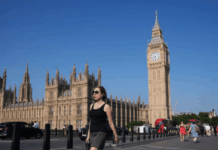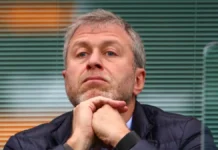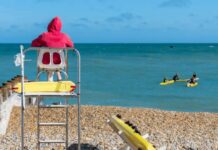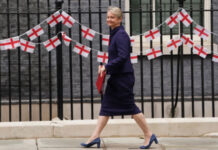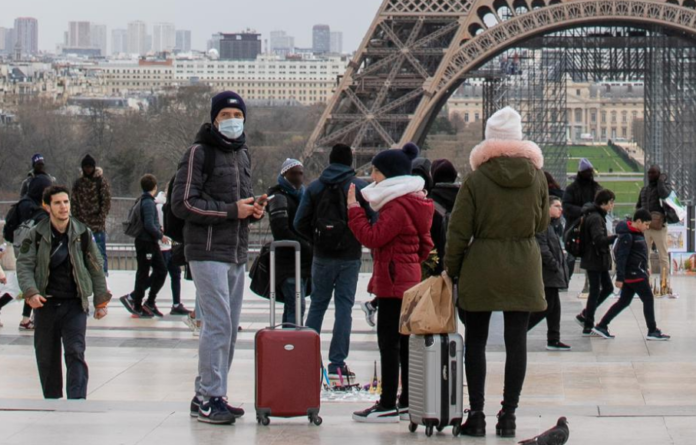
Thousands of holidaymakers have seen their plans thrown into chaos after UK quarantine measures were imposed on France from Saturday.
The 14-day isolation requirement begins at 04:00 BST and also applies to people arriving from the Netherlands, Monaco, Malta, Turks and Caicos, and Aruba.
It comes after France’s prime minister acknowledged infection numbers were going “the wrong way”.
France warned it would take “reciprocal measures”.
Clement Beaune, France’s secretary of state for European affairs, tweeted that the UK’s decision was a matter of “regret” for the French.
The UK government’s decision follows a surge in cases in the countries affected in recent days.
With up to half a million UK tourists thought to be in France at present, the deadline is expected to induce a rush to ports and airports, with thousands of tourists desperate to avoid quarantine.
The Eurotunnel website is reportedly struggling to deal with the volume of inquiries.
John Keefe, director of public affairs at Getlink, which operates the Channel Tunnel, told BBC’s Newsnight programme that the trains were “already pretty much fully booked” on Friday.
He said: “We just haven’t got the space to take everybody who might suddenly want to come up to the coast.”
Urging travellers to check online if there is space for them before heading to the terminal, he said people should understand “that it’s not going to be easy to get back” to the UK.
Airlines UK described it as “another devastating blow to the travel industry already reeling from the worst crisis in its history”.
The UK’s ambassador to France, Lord Llewellyn, acknowledged that the new quarantine rule would be “unwelcome news” for Britons in the country, but stressed that people could continue with their holidays as long as they follow safety precautions and self-isolate on their return.
Shadow home secretary Nick Thomas-Symonds said while the Labour party supports “evidence based measures” at the border, it was “vital” that No 10 had a “joined-up strategy” and “urgently” puts in place a specific deal to support the heavily impacted travel sector.
The MP added: “That the government has still not put in place an effective track, trace and isolate system has made matters far worse and made it more likely that we are reliant on the blunt tool of 14-day quarantine.”
He called on Downing Street to publish science behind its decisions, “and details of any work being done to reduce the time needed to isolate through increased testing and other measures”.
According to the data company Statista, people from the UK paid 10.35 million visits to France last year, putting it second behind Spain – with 18.12 million – in terms of popularity.
The Foreign Office is now warning against “all but essential travel” to France – the quarantine measure was imposed for Spain on 25 July.
The ending of more so-called “travel corridors” – allowing movement between the UK and the other countries with the need to self-isolate on return to the UK – follows a “significant change” in the risk of contracting Covid-19, the Department for Transport said.
It added that there had been a 66% increase in newly reported cases per 100,000 people in France since last Friday.
For the Netherlands, it was up 52%. And the increase for Malta was 105%, while it was 273% for Turks and Caicos and 1,106% for Aruba.
Mr Shapps said quarantine was needed because “we’ve absolutely work so hard to keep our numbers down here”, adding: “We can’t afford to re-import those cases from elsewhere.”
Bowling alleys to reopen
Ahead of a government meeting on the new measures, UK Prime Minister Boris Johnson promised to be “absolutely ruthless” in deciding on rules for holidaymakers from abroad.
“We can’t be remotely complacent about our own situation. Everybody understands that in a pandemic you don’t allow our population to be re-infected or the disease to come back in,” he added.
On Thursday, France reported 2,524 new coronavirus cases in 24 hours, the highest daily increase since its lockdown was lifted in May.
The country’s Prime Minister, Jean Castex, said on Tuesday that coronavirus numbers had been going “the wrong way” for a fortnight.
Meanwhile, the government has announced that maximum fines for people in England who repeatedly refuse to wear a face covering could double to £3,200, while organisers of illegal raves could face a £10,000 penalty.
But from Sunday indoor theatre, music and performance venues will be able to reopen with socially distanced audiences.
Casinos, bowling alleys, skating rinks and soft play centres will also be allowed to resume, as will “close-contact” beauty services such as facials, eyebrow threading and eyelash treatments.

